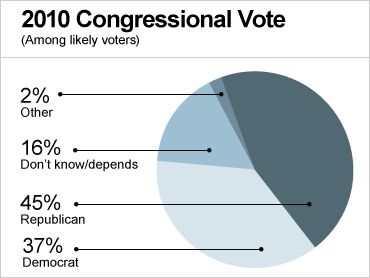GOP Widens Lead in Generic House Ballot, CBS Poll Finds
CBS News Poll analysis by the CBS News Polling Unit: Sarah Dutton, Jennifer De Pinto, Fred Backus and Anthony Salvanto.
Republicans have widened their lead against Democrats among likely voters in the generic ballot for the House of Representatives by six points since last month, a new CBS News Poll reports.
Republicans now hold an eight point lead over Democrats in the generic ballot, with 45 percent of likely voters saying they would support the Republican candidate for the House, and 37 percent saying they would support the Democrat. Last month Republicans led Democrats by a margin of only 2 points, with 40 percent saying they would vote for a Republican and 38 percent saying they would vote for a Democrat.
President Obama's overall favorability remains steady, the poll indicates, with 44 percent positive ratings and 45 percent negative, but his ratings on the economy are lower than ever before: 38 percent of respondents approved of his handling of the issue, while 50 percent disapproved. Last month, 41 percent approved, and 51 percent disapproved.
Critical Contests: Interactive Map with CBS News' Election 2010 Race Ratings
But while Democrats have lately been making widespread efforts to diminish the so-called "enthusiasm gap" between Republican and Democratic voters, the poll, which was conducted from October 1 - 5, indicates that the gap has in fact expanded. Sixty percent of Republicans said they were more enthusiastic than usual about voting this year, while only 40 percent of Democrats said the same. Last month, 47 Democrats and 58 percent of Republicans said they were more excited than usual to vote.
At forty-nine percent, Independents are now more enthusiastic than Democrats, the poll indicates.
But according to the poll, Independents are largely dissatisfied with their choices in the upcoming election: While they favor Republicans by a 20 point margin, 61 percent of Independents polled said they wished there were other options on the ballot.
Generally speaking, faith in House Representatives was quite low among likely voters. Seventy-one percent of respondents said they disapproved of the job Congress was doing, and 18 percent said they approved. The public's approval of their own representatives was slightly higher (40 percent approved and 40 percent disapproved), but that figure is the lowest since 1978, when CBS News started polling on the issue.
The survey also tested voters' perceptions of House Speaker Nancy Pelosi and Minority Leader John Boehner, both of whom were viewed unfavorably compared to Mr. Obama. Compared to a 42 percent favorability rating for Mr. Obama, Pelosi has a 15 percent favorability rating and Boehner has an eight percent rating. The president's unfavorable rating is 39 percent, compared to 44 percent for Pelosi and 15 percent for Boehner.
However, many voters are either undecided about the congressional leaders or haven't heard enough - 18 percent are undecided about Pelosi and 17 about Boehner. Twenty-two percent of respondents said they hadn't heard enough about Pelosi, and 59 percent said they hadn't heard enough about Boehner.
Poll: Tea Partiers Say GOP Represents Their Values
Poll: Just 22% See Palin as Effective President
Obama's Approval Rating on Economy Falls Further
Fifty-six percent of Republicans - and 35 percent of voters overall - said they were voting in opposition to the speaker. Twenty-four percent of Democrats and 11 percent of all voters said they were casting votes in support of Pelosi this fall.
Despite his favorability over Boehner and Pelosi, only 33 percent of Americans think Mr. Obama has been a very good or good president so far, and he has fallen short of many voters' expectations: In January of 2009, 68 percent of those polled said they thought Mr. Obama would be very good or good at the job, and only 4 percent thought he do poorly. Currently, however, 27 percent of respondents say they think he's doing a poor job. Thirty-nine percent say he's been average.
Overall, the president has a negative influence on voters' choice in November. Twice as many voters - 31 percent, as compared to 15 percent - said his support would make them less likely to back that candidate, although those numbers differed within each party. Thirty-three percent of Democrats said Mr. Obama's support would make them more likely to vote for that candidate, and 59 percent of Republicans said it would make them less likely. (Fifty-one percent of overall voters said the president's endorsement would not impact their vote either way.)
When asked about the "Pledge to America" recently unveiled by House Republicans, 61 percent of voters said they had never heard of it. Among those Republicans who had, 58 percent said they supported most of the ideas it represented.
Read the Complete Poll
CBSNews.com Special Report: Election 2010
This poll was conducted among a random sample of 1,129 adults nationwide, interviewed by telephone October 1-5, 2010. Phone numbers were dialed from RDD samples of both standard land-lines and cell phones. The error due to sampling for results based on the entire sample could be plus or minus three percentage points. The error for subgroups is higher. This poll release conforms to the Standards of Disclosure of the National Council on Public Polls.
Lucy Madison is a political reporter for CBSNews.com. You can read more of her posts here. Follow Hotsheet on Facebook and Twitter.

